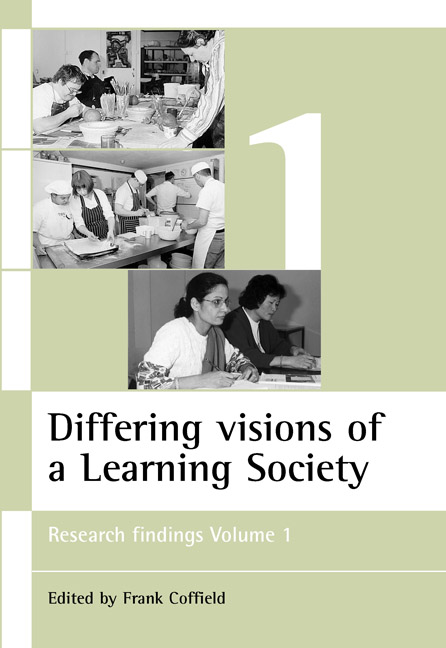Book contents
- Frontmatter
- Contents
- Notes on contributors
- Introduction: A critical analysis of the concept of a learning society
- one ‘Worlds apart’ – Education markets in the post-16 sector of one urban locale 1995-98
- two Unifying academic and vocational learning in England, Wales and Scotland
- three Skill development in higher education and employment
- four The variable contribution of guidance services in different types of learning societies
- five Changing patterns of training provision in the National Health Service: an overview
- six Working and learning in Britain and Germany: findings of a regional study
- seven Development of knowledge and skills at work
- Index
six - Working and learning in Britain and Germany: findings of a regional study
Published online by Cambridge University Press: 05 July 2022
- Frontmatter
- Contents
- Notes on contributors
- Introduction: A critical analysis of the concept of a learning society
- one ‘Worlds apart’ – Education markets in the post-16 sector of one urban locale 1995-98
- two Unifying academic and vocational learning in England, Wales and Scotland
- three Skill development in higher education and employment
- four The variable contribution of guidance services in different types of learning societies
- five Changing patterns of training provision in the National Health Service: an overview
- six Working and learning in Britain and Germany: findings of a regional study
- seven Development of knowledge and skills at work
- Index
Summary
Introduction
In attempts to create a Learning Society the concept of multi-skilling plays an important role in relation to learning at work and organisational learning. This paper presents an overview of a project which was entitled ‘Training for multi-skilling: a comparison of British and German experience’. The following two sections outline the background to and theoretical conceptualisation of this study. These are followed by a discussion of the objectives and methodology. The main part of this paper presents the findings of this research and the conclusions that could be drawn from the results.
The Learning Society and multi-skilling: background and concepts
For some considerable time commentators both in the labour market and academia have been aware of a ‘skills deficit’ or low skills equilibrium in Britain. This implies the notion that Britain's labour force is less well trained, skilled and educated than that of competitor nations and, therefore, less able to compete in increasingly globalised markets. Concerns about the lack of appropriately skilled and trained workers in Britain, particularly at intermediate level, have existed at least for a decade (for example Finegold and Soskice, 1988; Keep, 1993; Steedman, 1998) and both the previous Conservative and the present Labour government have declared ‘education and training’ to be flagship policy areas. Both have produced a plethora of policy documents in this area and many new initiatives have been introduced. These initiatives have aimed primarily at increasing access to education, training and learning, such as Investing in Young People, Learning Direct, the National Grid for Learning or the University for Industry as well as initiatives directly geared at facilitating learning, education and training, such as the New Deal, National Records of Achievement, Learning Cards (planned), Individual Learning Accounts (planned) and the current review of the National Targets for Education and Training, as well as new qualifications such as National Traineeships, Higher Modern Apprenticeships and new ‘starter’ qualifications aimed below NVQ level 2 (DfEE, 1998a; Welsh Office, 1998). This new framework geared at facilitating education and training also includes the launch of a network of National Training Organisations.
In the wider area of education, training and learning, the Labour government has continued and built on Conservative policies and initiatives almost without a conceptual break.
- Type
- Chapter
- Information
- Differing visions of a Learning Society Vol 1Research Findings, pp. 199 - 230Publisher: Bristol University PressPrint publication year: 2000

